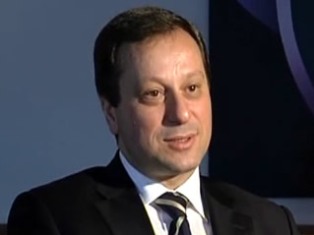
 Ani Avetyan
Ani Avetyan
Azad-Hye
The “Regional Security Dynamics in Southern Caucasus” annual two-day international forum took place on November 29th, 2012, where rector of the Kadir Has Turkish University, Mustafa Aydin was also present. He was more than glad to answer the reporters' questions, the first of which was about the Armenian-Turkish relations, the signing of the protocols and the reason that they were not ratified.
“There's no progress in the Armenian-Turkish relations whatsoever, and there's no such item on Turkey's agenda. The reason behind that are the developments taking place in the Middle East. Once the issues there and in Syria are resolved, the interest and attention for the Armenian-Turkish relations will increase. Currently, the Turkish policy is focused on resolving internal issues. In 2014, we are going to have our presidential elections; our prime minister wants to become president and wants constitutional amendments. There's also the Kurdish issue,? Aydin said.
According to him, the Turkish policy is not anti-Armenia but rather pro-Azerbaijan, the basis of which is not brotherhood but economical interests.
“You should understand that Azerbaijan's relations with Turkey are strategic, but with Armenia, it's about disagreements and not enmity.” Mustafa Aydin said in reference to the reporters' remark that Azerbaijan's hostility was extending over Turkey as well.
About handing over the Azerbaijani Ramil Safarov, who had killed an Armenian officer in his sleep, with an ax, during a NATO course in Budapest, Mustafa Aydin answered: “It shouldn't have happened, of course, I condemn it”.
In the end, when the reporters mentioned the genocide and told him that as a scientist he should recognize it, Mustafa Aydin said: “I don't believe that there was genocide, I believe that murders were committed and that many people were killed. Now the relations will be regulated and the borders will open, however, we need a lot of time and negotiations to achieve that”.
About Mustafa Aydin (from Wikipedia)
Mustafa Aydin is a Turkish Professor of International Relations.He is currently the Rector of Kadir Has University, Istanbul, and the President of the International Relations Council (UIK) of Turkey. He is also Co-Coordinator of the International Commission on the Black Sea. He was Head of the Department of International Relations at the TOBB University of Economics and Technology; Director of International Policy Research Institute (TEPAV-IPRI) of Ankara; member of the Economy and Foreign Policy Study Group of the President?s Office; Board Member of the strategic research centers of both the Turkish Ministry of Foreign Affairs and Turkish Armed Forces; Deputy Chairperson of the International Commission of Eminent Persons on the Caucasus and Caspian (2007); Alexander S. Onassis Fellow at the University of Athens (2003); Research Fellow at the EU Institute for Security Studies, Paris (2003); Fulbright Scholar at the JFK School of Government, Harvard University (2002); and UNESCO Fellow at the Richardson Institute for Peace Studies, UK (1999).
TEXT IN AREMENIAN
Թուրքիայի Քադըր Հաս համալսարանի ռեկտոր. ?Թուրքիայի պրոադրբեջանական քաղաքականության հիմքում ոչ թե եղբայրությունն է, այլ տնտեսական և այլ շահերը?
Անի Ավետյան
Ազատ-Հայ
Նոյեմբերի 29-ին (2012) Երևանում տեղի ունեցած ?Տարածաշրջանային անվտանգության դինամիկան Հարավային Կովկասում? ամենամյա երկօրյա միջազգային ֆորումին Թուրքիայից մասնակցելու էր եկել Քադըր Հաս համալսարանի ռեկտոր Մուստաֆա Այդինը: Լրագրողների հարցերին պատասխանելու խնդրանքին նա արձագանքեց միանգամից: Առաջինը հայ-թուրքական հարաբերությունների մասին հարցն էր՝ հայտնի արձանագրությունների ստորագրման և չվավերացման համատեքստում:
?Հայ-թուրքական հարաբերություններում ոչ մի զարգացում տեղի չի ունենում, և Թուրքիայի օրակարգում այդպիսի հարց չկա: Պատճառը Մերձավոր Արևելքում տեղի ունեցող զարգացումներն են: Երբ Մերձավոր Արևելքի խնդիրները, Սիրիայի հարցը լուծվեն, այն ժամանակ հայ-թուրքական հարաբերությունների հանդեպ հետաքրքրությունը և ուշադրությունը նորից կմեծանան: Իսկ հիմա թուրքական քաղաքականությունը կենտրոնացված է նաև ներքին խնդիրներ լուծելուն: 2014 թվականին մեզ մոտ նախագահական ընտրություններ են լինելու, մեր վարչապետն ուզում է նախագահ դառնալ, սահմանադրական փոփոխություններ է ուզում: Քրդական հարցն էլ կա?, – ասաց Մուստաֆա Այդինը:
Նրա խոսքով Թուրքիայի քաղաքականությունը ոչ թե ընդգծված հակահայկական է, այլ ընդգծված պրոադրբեջանական, և դրա հիմքում էլ ոչ թե եղբայրությունն է, այլ տնտեսական շահերը:
?Դուք պիտի հասկանաք, որ Ադրբեջանի հետ Թուրքիայի հարաբերությունները ռազմավարական են, իսկ Հայաստանի հետ կան անհամաձայնություններ, ոչ թե թշնամանք?, – ասաց Մուստաֆա Այդինը՝ անդրադառնալով լրագրողների այն նկատառմանը, թե Ադրբեջանի թշնամանքը տարածվում է նաև Թուրքիայի վրա:
Բուդապեշտում ՆԱՏՕ-ի դասընթացի ընթացքում քնած հայ սպային կացնահարած ադրբեջանցի Ռամիլ Սաֆարովի արտահանձնման մասին հարցին Մուստաֆա Այդինը պատասխանեց. ?Այդպիսի բան չպիտի լիներ, իհարկե, ես դատապարտում եմ?:
Վերջում անդրադառնալով Ցեղասպանությանը և լրագրողների դիտարկամանը, թե որպես գիտնական նա պետք է որ իմանա` Ցեղասպանություն եղել է, Մուստաֆա Այդինն ասաց. ?Ես չեմ կարծում, որ եղել է ցեղասպանություն, եղել են սպանություններ և շատ մարդիկ են մահացել: Հիմա հարաբերությունները պիտի կարգավորվեն, սահմանը պիտի բացվի, բայց դրա համար շատ ժամանակ և բանակցություններ պետք կլինեն?:
